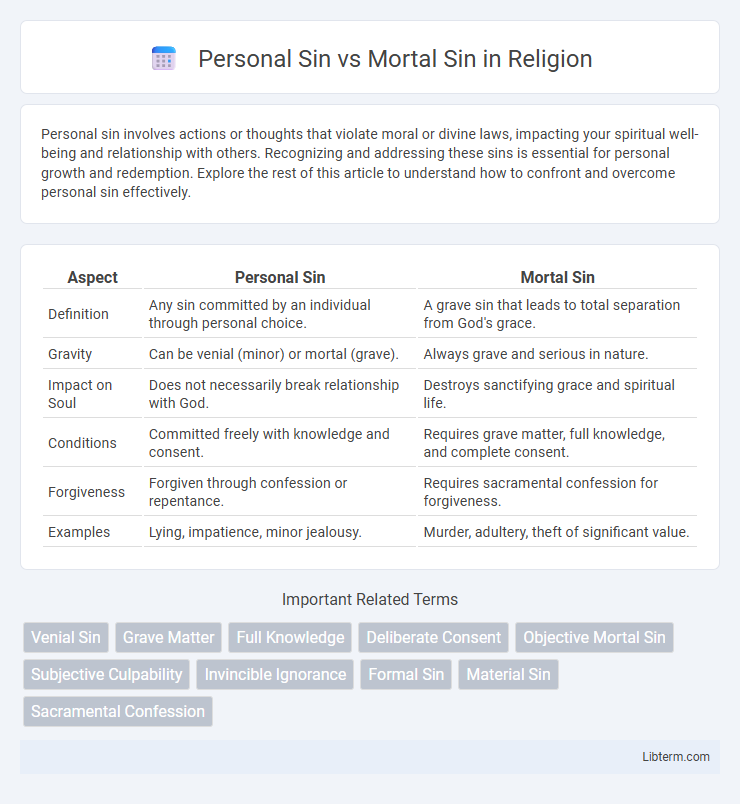Personal sin involves actions or thoughts that violate moral or divine laws, impacting your spiritual well-being and relationship with others. Recognizing and addressing these sins is essential for personal growth and redemption. Explore the rest of this article to understand how to confront and overcome personal sin effectively.
Table of Comparison
| Aspect | Personal Sin | Mortal Sin |
|---|---|---|
| Definition | Any sin committed by an individual through personal choice. | A grave sin that leads to total separation from God's grace. |
| Gravity | Can be venial (minor) or mortal (grave). | Always grave and serious in nature. |
| Impact on Soul | Does not necessarily break relationship with God. | Destroys sanctifying grace and spiritual life. |
| Conditions | Committed freely with knowledge and consent. | Requires grave matter, full knowledge, and complete consent. |
| Forgiveness | Forgiven through confession or repentance. | Requires sacramental confession for forgiveness. |
| Examples | Lying, impatience, minor jealousy. | Murder, adultery, theft of significant value. |
Understanding Sin: Definition and Types
Personal sin refers to individual acts of wrongdoing that harm one's relationship with God, while mortal sin is a grave violation of divine law that results in the loss of sanctifying grace. Mortal sins must meet three conditions: grave matter, full knowledge, and deliberate consent, making them distinct from venial sins, which are less serious. Understanding the differences between these types of sins is essential for recognizing their spiritual consequences and the need for repentance.
What is Personal Sin?
Personal sin refers to any deliberate thought, word, deed, or omission that offends God's moral law and damages the sinner's relationship with Him. It contrasts with mortal sin, which is a grave violation that destroys sanctifying grace and leads to spiritual death if unrepented. Understanding personal sin involves recognizing both venial sins, which weaken but do not break divine friendship, and mortal sins, which require sacramental confession for reconciliation.
Characteristics of Personal Sin
Personal sin involves individual choices that violate moral or divine law, marked by awareness and deliberate consent to wrongdoing. It can be either venial, which weakens but does not sever the relationship with God, or mortal, which causes complete separation due to grave matter, full knowledge, and deliberate consent. The key characteristics include personal responsibility, moral culpability, and the potential for repentance and reconciliation.
What is Mortal Sin?
Mortal sin is a grave violation of God's law that destroys the soul's sanctifying grace and results in spiritual death if unrepented. It requires full knowledge of the sin's seriousness, deliberate consent, and grave matter, such as murder, adultery, or blasphemy. Committing a mortal sin separates the individual from God's grace until reconciled through the sacrament of confession.
Key Differences Between Mortal Sin and Personal Sin
Mortal sin is a grave offense in Catholic theology that causes the complete separation of the soul from God's grace, requiring full knowledge, deliberate consent, and serious matter. Personal sin includes all individual sins, both mortal and venial, reflecting a broader category that encompasses any wrongdoing committed by a person. The key difference lies in the severity and spiritual consequences: mortal sin destroys sanctifying grace, while personal sin may not always reach that level of severity.
Theological Foundations of Sin
Personal sin refers to individual acts that contravene God's moral law, arising from free will and personal choice, whereas mortal sin represents a grave violation that destroys the sanctifying grace in the soul, severing a believer's relationship with God. Theological foundations emphasize that mortal sin requires full knowledge and deliberate consent, distinguishing it from venial or lesser personal sins, which weaken but do not break communion with God. Scriptural and doctrinal teachings, particularly in Catholic theology, highlight the necessity of repentance and sacramental confession to restore grace after mortal sin.
Effects of Mortal Sin on the Soul
Mortal sin causes a complete separation from God's grace, severing the soul's relationship with the Divine and resulting in spiritual death. Unlike personal sin, which damages but does not destroy the soul's sanctifying grace, mortal sin deprives the soul of sanctity, making it incapable of eternal union with God without repentance. This grave offense requires sacramental confession for reconciliation and restoration of grace.
Examples of Personal and Mortal Sins
Personal sins include everyday wrongdoings such as lying, gossiping, or harboring resentment, which harm relationships but do not sever divine grace. Mortal sins, such as murder, adultery, or blasphemy, involve grave matter, full knowledge, and deliberate consent, resulting in a complete rupture of the soul's communion with God. Examples of personal sins involve minor acts of dishonesty or envy, while mortal sins encompass serious offenses like theft, abortion, and sacrilege.
Repentance and Forgiveness: Healing from Sin
Personal sin refers to individual acts that separate a person from God but can be forgiven through sincere repentance and God's mercy. Mortal sin, being a grave violation of God's law, requires genuine contrition, confession, and penance for reconciliation and spiritual healing. True forgiveness and healing from both types of sin occur when one embraces repentance, seeks sacramental grace, and turns away from sinful behaviors.
Avoiding Sin: Practical Guidance for Daily Life
Avoiding personal and mortal sin requires conscious effort and a clear understanding of moral principles outlined in religious teachings. Practicing regular self-examination, prayer, and seeking spiritual guidance helps individuals recognize and overcome temptations, fostering a disciplined moral life. Incorporating acts of charity, humility, and forgiveness into daily routines strengthens resistance to sin and promotes spiritual growth.
Personal Sin Infographic

 libterm.com
libterm.com